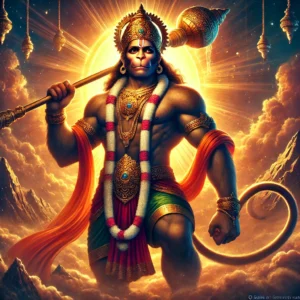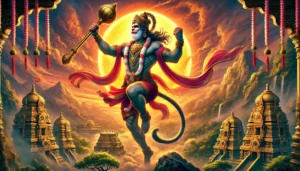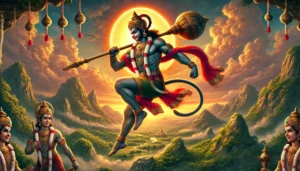
Hanuman as a protector and guide in life
Hanuman: The Timeless Devotee of Lord Rama
In the tapestry of Sanatan Dharma, certain figures transcend the boundaries of time and space, inspiring devotees across generations. Among them is Hanuman, the invincible devotee of Lord Rama, whose unwavering faith, unparalleled strength, and selfless service make him one of the most revered deities in Hinduism. Known as Pavanputra Hanuman or Anjaneya, he is both a warrior and a sage, blending physical might with spiritual wisdom.
Hanuman’s life, as chronicled in the Ramayana and other sacred texts, is a profound lesson in devotion (bhakti), strength (shakti), and surrender (samarpan). Let us explore his divine qualities and their relevance in our lives today.
The Epitome of Bhakti (Devotion)
Hanuman’s devotion to Lord Rama is not just an expression of loyalty but the essence of divine love. He saw no difference between himself and his Lord. In his heart, Lord Rama and Sita resided eternally. When questioned about his identity, Hanuman humbly replied:
“When I do not know who I am, I serve Lord Rama as his devotee.
When I understand who I am, I see myself as a spark of the divine.”
This statement captures the duality of Hanuman’s existence—both as a servant and a reflection of the divine. It is this understanding that makes Hanuman the ideal devotee. His unwavering faith and love for Lord Rama inspire us to cultivate humility and surrender in our spiritual journey.
Table of Contents

Hanuman as a protector and guide in life
Hanuman’s Role in the Ramayana
Hanuman’s contributions to the epic Ramayana are immeasurable. Every challenge he faced, he approached with courage, wisdom, and faith.
1. Leaping Across the Ocean
One of Hanuman’s most celebrated feats is his leap across the ocean to reach Lanka in search of Sita. This task was not just a demonstration of physical prowess but also a testament to his spiritual strength. Before making the leap, Hanuman overcame self-doubt and rediscovered his latent powers with the encouragement of his companions. This episode teaches us that true strength arises from self-belief and the support of a positive community.
2. Burning Lanka
Upon discovering Sita in Ashok Vatika, Hanuman displayed his fiery valor by setting Ravana’s golden city ablaze. This act symbolized the destruction of evil and the triumph of righteousness. His fearless spirit inspires us to confront injustice and uphold dharma in our lives.
3. Carrying the Dronagiri Mountain
When Lakshmana fell unconscious on the battlefield, it was Hanuman who brought the life-saving Sanjeevani herb. Unable to identify the herb, he uprooted the entire Dronagiri mountain and carried it to the battlefield. This extraordinary feat of strength and determination reflects his unwavering commitment to his mission.
The Strength of Hanuman
Hanuman is often depicted as the embodiment of physical, mental, and spiritual strength. His unparalleled power is not merely a result of his divine lineage but also his disciplined lifestyle, devotion, and connection to the divine.
Physical Strength
Hanuman’s physical might is unmatched. Blessed by multiple gods, including Lord Shiva, Vayu (the wind god), and Indra, his strength knows no bounds. He can lift mountains, overpower demons, and accomplish superhuman tasks effortlessly.
Mental Strength
Hanuman’s mental fortitude is equally remarkable. Even in the face of adversity, he remains calm, focused, and determined. His clarity of thought and quick decision-making skills are evident throughout the Ramayana, whether it is identifying Ravana’s intentions or devising strategies during battles.
Spiritual Strength
What truly sets Hanuman apart is his spiritual strength. His unwavering devotion to Lord Rama is the source of his limitless power. By surrendering his ego and aligning his will with the divine, Hanuman taps into the infinite reservoir of cosmic energy.

Hanuman as a protector and guide in life
Hanuman as a Teacher and Guide
Beyond his heroic deeds, Hanuman is a spiritual guide who teaches us invaluable lessons.
Selflessness
Hanuman’s life is a testament to the power of selflessness. Every action he undertakes is for the benefit of others, whether it is rescuing Sita, saving Lakshmana, or serving Lord Rama. His example encourages us to act without selfish motives.
Humility
Despite his immense power, Hanuman remains humble. He never boasts of his achievements, always attributing his success to Lord Rama. This humility is a reminder that true greatness lies in acknowledging the divine source of our abilities.
Focus and Determination
Hanuman’s single-minded focus on his mission is awe-inspiring. Whether it is finding Sita or bringing the Sanjeevani herb, he completes his tasks with unwavering determination. His focus teaches us to pursue our goals with dedication and perseverance.
Overcoming Doubts
Hanuman’s journey is also about overcoming self-doubt. Initially unaware of his own strength, he needed Jambavan’s encouragement to realize his potential. This reminds us that we often underestimate ourselves and that faith and encouragement can unlock our true capabilities.
Hanuman in Modern Times
Hanuman’s relevance extends far beyond the pages of the Ramayana. In the modern world, where stress, fear, and self-doubt often dominate our lives, Hanuman serves as a beacon of hope and strength. Chanting the Hanuman Chalisa is believed to dispel fear, provide courage, and overcome obstacles. Devotees often turn to Hanuman for protection, guidance, and strength in times of need.
His qualities—devotion, strength, humility, and resilience—are timeless virtues that we can incorporate into our daily lives. By following Hanuman’s example, we can overcome challenges, cultivate faith, and live a life of purpose and service.
Conclusion
Hanuman is not just a hero of the Ramayana; he is an eternal presence who continues to inspire and guide humanity. As the ultimate devotee of Lord Rama, he exemplifies the power of bhakti and the boundless potential of the human spirit when aligned with the divine.
In worshiping Hanuman, we are reminded of the infinite strength within us and the importance of humility, selflessness, and devotion. May we all strive to embody the virtues of Hanuman and walk the path of dharma with courage and faith.
For more such insights into Sanatan Dharma, mythology, and ancient wisdom, visit Prachin Sanatan Yuga.

Hanuman as a protector and guide in life
FAQs on “Hanuman: The Eternal Symbol of Devotion and Strength.”
1. Who is Lord Hanuman in Sanatan Dharma?
Lord Hanuman is a divine entity in Sanatan Dharma, often regarded as the son of Vayu (the wind god) and an incarnation of Lord Shiva. His role as a devoted servant of Lord Rama in the epic Ramayana has cemented his place as a symbol of selfless service, unflinching loyalty, and boundless strength. Known as “Anjaneya” in the south, Hanuman is widely revered across India and beyond.
2. What is the significance of Hanuman’s birth and his connection to Vayu?
Hanuman was born as a boon to his mother, Anjana, who was an apsara cursed to live on Earth. The wind god, Vayu, played a pivotal role in granting him life, which endowed him with immense strength, agility, and the power to traverse great distances. This connection makes Hanuman the epitome of vitality and endurance, reflecting the life-giving force of air itself.
3. What divine blessings did Hanuman receive, and how do they contribute to his strength?
Hanuman received blessings from several deities:
Lord Shiva: Bestowed Hanuman with invincibility and unparalleled strength.
Lord Brahma: Granted him immunity from fear and the ability to resist fire.
Indra: Made his body indestructible and gave him the power to control his size.
Vayu: Endowed him with speed and agility, akin to the wind.
These blessings combined to make Hanuman one of the most powerful beings in Sanatan Dharma.
4. What are some of Hanuman’s most iconic feats of strength?
Leaping to Lanka: Hanuman’s leap across the ocean symbolizes his immense physical and mental strength, motivated by his unwavering devotion to Lord Rama.
Lifting the Dronagiri Mountain: Hanuman carried an entire mountain to deliver the Sanjeevani herb, showcasing his physical prowess and determination.
Burning Lanka: Using his burning tail, Hanuman set the golden city of Lanka ablaze, demonstrating his power and strategy in battle.
5. How does Hanuman embody spiritual strength?
Hanuman’s strength extends beyond his physical abilities. His spiritual strength comes from his deep devotion to Lord Rama, his humility, and his ability to overcome ego and desires. Hanuman’s unwavering focus on his duty and his pure heart make him a symbol of inner resilience.
6. Why is Hanuman called the ideal devotee?
Hanuman’s life is a testament to Bhakti Yoga (the path of devotion). He is called “Dasya Bhakta” because of his selfless service to Lord Rama. Despite his immense power, he never sought recognition, attributing all his achievements to his Lord. His famous saying, “I am Rama’s servant,” highlights his humility and devotion.
7. How does Hanuman inspire personal growth in devotees?
Hanuman’s qualities, such as courage, discipline, and focus, inspire devotees to overcome their fears and challenges. His stories teach the importance of humility, loyalty, and faith in achieving success and inner peace.
8. What role does the Hanuman Chalisa play in his worship?
The Hanuman Chalisa is a 40-verse hymn composed by Tulsidas. It praises Hanuman’s strength, wisdom, and devotion. Chanting it regularly is believed to:
Remove fears and obstacles.
Grant physical and mental strength.
Provide protection from negative energies.
Enhance focus, confidence, and spiritual growth.
9. What are some lesser-known qualities of Hanuman?
Wisdom and Learning: Hanuman is a scholar who mastered the Vedas and other scriptures. His intellect matches his strength.
Shape-shifting Abilities: He could change his size at will, symbolizing adaptability and strategic thinking.
Healer and Protector: Hanuman is worshipped as a healer and is invoked to ward off illnesses and negative influences.
10. What is the relevance of Hanuman’s character in the modern world?
In today’s fast-paced world, Hanuman’s qualities serve as guiding principles:
His resilience teaches us to face challenges with courage.
His humility reminds us to remain grounded despite success.
His loyalty inspires us to stay committed to our duties and relationships.
His devotion underscores the importance of faith and spiritual growth.
11. How is Hanuman worshipped across India?
Hanuman is worshipped in various forms across India:
Hanuman Jayanti: Celebrated to honor his birth.
Sankat Mochan Hanuman: Invoked to remove obstacles and fears.
Panchamukhi Hanuman: Worshipped for his protective and multifaceted nature.
Temples dedicated to Hanuman often feature massive idols, symbolizing his towering strength and protective presence.
12. Why is Hanuman associated with celibacy and discipline?
Hanuman is regarded as a Brahmachari (celibate) who dedicated his life to serving Lord Rama. His disciplined lifestyle and focus on his duties inspire devotees to cultivate self-control and channel their energies towards spiritual goals.
13. What is the meaning of Hanuman’s name?
The name Hanuman is derived from the Sanskrit words “Hanu” (jaw) and “Man” (disfigured), referring to an injury he sustained as a child. Despite the incident, he rose to become a symbol of invincibility, reminding us to transform adversities into strengths.
14. How does Hanuman’s tale connect with yogic practices?
Hanuman embodies key aspects of yoga:
Bhakti Yoga: His devotion to Rama symbolizes love and surrender to the divine.
Karma Yoga: His actions reflect selfless service and duty.
Raja Yoga: His disciplined mind demonstrates focus and meditation.
15. What are Hanuman’s five faces in his Panchamukhi form?
The Panchamukhi Hanuman form represents five aspects:
Hanuman (Monkey face): Courage and strength.
Narasimha (Lion face): Protection and fearlessness.
Garuda (Eagle face): Overcoming negative forces.
Varaha (Boar face): Groundedness and spiritual elevation.
Hayagriva (Horse face): Knowledge and wisdom.
Summary
Hanuman: The Eternal Symbol of Devotion and Strength
Hanuman, the revered monkey deity, stands as an eternal symbol of devotion, strength, and selfless service in Sanatan Dharma. Known for his unwavering loyalty to Lord Rama, Hanuman exemplifies the power of bhakti (devotion) and surrender. His immense physical strength, intelligence, and courage are matched by his spiritual wisdom and humility.
From leaping across the ocean to find Sita to carrying the Dronagiri mountain to save Lakshmana, Hanuman’s feats are legendary. Yet, his greatest strength lies in his unshakable faith and dedication, which inspire countless devotees to overcome life’s challenges with grace and determination. Hanuman’s timeless story reminds us that true strength emerges from humility, selflessness, and an unyielding commitment to dharma.
Related Articles
- Restful Nights: Ayurvedic Remedies and Traditional Indian Practices to Overcome Insomnia and Late-Night Habits
- The Tridevi: Lakshmi, Saraswati, and Parvati – Their Roles and Powers
- “Divine Creatures of Ancient Indian Scriptures: Exploring the Role of Animals in the Vedas, Puranas, and Mahabharata”
- Nature and Spirituality: Exploring the Sacred Essence of the Himalayas, Ganga, and Other Natural Wonders”
- “Reviving the Gurukul System: Relevance and Lessons for Modern Education”
- “Exploring Greek and Indian Mythology: Similarities Between Greek and Indian Mythology “
- “Embracing Sattvic Living: Harmonizing Mind, Body, and Soul Through Food and Lifestyle”
- “Charity and Prosperity: Exploring the Concept of Daan and Its Financial Relevance in Modern Life”
- How to Build an Eco-Friendly Home Inspired by Vastu Shastra
- Comparison of Ancient and Modern Sports: How Traditional Sports Have Influenced Contemporary Games
- “Timeless Lessons from Ancient Tales: Linking Samudra Manthan and Ganga’s Descent to Modern Ecological Challenges”
- “Reviving Sanskrit: How AI is Preserving Ancient Languages for the Future”
- “Mathura: The Sacred Land of Lord Krishna’s Divine Leelas”
- Investing for Future Generations: Lessons from Indian Traditions on Legacy Building and Wealth Preservation
- “Ancient Indian Wisdom: Timeless Lessons for Tackling Today’s Climate Crisis”
- “Artificial Intelligence and Spirituality: Transforming Ancient Practices for the Modern World”
- “Gold and Real Estate in India: Timeless Assets Shaping Financial Strategies”
- Tradition Meets Innovation: The Evolution of Technology in Hindu Rituals
- End-of-World Myths: Exploring Kali Yuga in Hinduism and Ragnarök in Norse Mythology
- Garuda, Pegasus, and Dragons: The Universal Ties of Mythical Beasts Across Cultures
- “Ancient Vimanas: Mythical Flying Machines or Evidence of Advanced Technology?”
- Time Travel in Hindu Mythology: The Fascinating Tales of Kakudmi and King Raivata
- “Divine Feminine Power in Hindu Mythology: The Legends of Durga, Saraswati, and Lakshmi”
- “Divine Beings of Sanatan Dharma: The Spiritual Significance of Sacred Animals in Hinduism”
- “Symbolism in Mythological Art: Unlocking Hidden Meanings in Ancient Temple Carvings”
- “Exploring Technological Advancements in Ancient India and Civilizations: Vimana, Metallurgy, & Water Management systems”
- Unveiling the Mysteries: Ancient Temples of Sanatan Dharma , Mysterious Temples of India
- “The Scientific Knowledge of Sanatan Dharma: Ancient Wisdom Meets Modern Science”
- Ancient Indian Sports and Games: Celebrating a Legacy of Skill, Strength & Strategy”
- “Exploring the Cosmic Link: The Connection Between Astronomy and Vedic Astrology”
- The Power of Sanskrit: Unlocking the Divine Language of the Gods
- “The End of Kaliyuga: A Sanatan Insight into the World’s Final Chapter”
- Explore more articles on Prachin Sanatan Yuga.
Hanuman’s devotion to Lord Rama is not just an expression of loyalty but the essence of divine love. He saw no difference between himself and his Lord. In his heart, Lord Rama and Sita resided eternally.
In worshiping Hanuman, we are reminded of the infinite strength within us and the importance of humility, selflessness, and devotion. May we all strive to embody the virtues of Hanuman and walk the path of dharma with courage and faith.


jai shree ram 🕉️
जय श्री राम 🕉